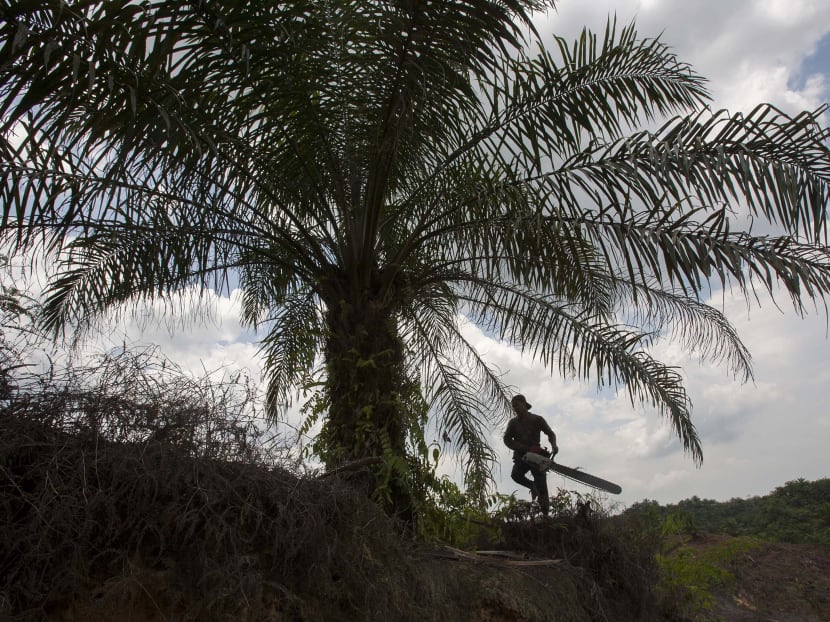Palm plantation boom fuels discontent on Palawan
PUERTO PRINCESA (Philippines) — The western Philippine province of Palawan, widely considered the country’s last ecological frontier, was declared a United Nations Educational, Scientific and Cultural Organisation (Unesco) Man and Biosphere Reserve in the 1990s.
PUERTO PRINCESA (Philippines) — The western Philippine province of Palawan, widely considered the country’s last ecological frontier, was declared a United Nations Educational, Scientific and Cultural Organisation (Unesco) Man and Biosphere Reserve in the 1990s.
Yet a long stretch of land on the southern tip of Palawan is now covered by palm plantations as far as the eye can see.
In recent years, palm plantations have expanded in a big way, bringing with them deforestation, a decimation of the local coconut farming industry and, farmers say, broken promises of profit-sharing.
Ten years ago, Mr Amirul Marinse, a former coconut farmer in Iraray Sofronio, Espanola, Palawan, rented out his 7ha of land to the Agumil Company for 1,000 pesos (S$28) per hectare annually. The agreement, he said, included profit-sharing from palm oil harvests after three years.
But to this day, Mr Marinse — a 68-year-old member of the Pala’uan tribe — said he has not received any profits. He is also trapped in a 30-year contract.
Now, Mr Marinse added, he cannot even afford a buffalo-drawn carriage. “We were promised we could have a big house or even buy a car in one year (with the profits) from one hectare alone. Unfortunately, we cannot even buy food and medicine for ourselves,” he said.
DECLINING BIODIVERSITY
Palm oil comes from the trees that are native to West Africa and thrive in any hot and wet tropical climate. Today, palm trees are widely grown in Asia, Africa and the Americas, with the biggest palm plantations in Indonesia and Malaysia.
Mr Rodico Asil, Pala’uan tribal chief in Barangay Iraray, Sofronio Espanola, said Agumil started planting palm trees here in 2005, when many tribal communities leased their land to the firm. His older brother also rented out his 1.5ha coconut farm to Agumil for a 30-year period, but Mr Asil opted to remain a coconut farmer.
He said these conversions to palm plantations hurt indigenous communities by destroying farmland and rainforests.
The hunting grounds of the indigenous peoples have disappeared, and with them the forest products on which they had depended for survival.
Their water sources also became heavily polluted.
Indigenous groups say the plantations are endangering the biodiversity, water resources and soil since the local community is prohibited by the palm oil firms from planting vegetables, sweet potato, cassava and other root crops.
RISING DISCONTENT
Palm oil is used by multinational companies such as Nestle and Kellogg’s for manufacturing a long list of food products, and Unilever for its personal care and beauty products.
The most widely produced vegetable oil in the world, palm oil is a major ingredient in candy bars, soap, biofuel and lipstick, among other products.
Mr John Mart Salunday, 36, Tagbanwa tribal chief and concurrent president of Nagkakaisang Tribu sa Palawan (NTP), a provincial-level federation for indigenous people, said during a seminar on environment reporting initiated by the Philippine Press Institute (PPI) that locals were lured into replacing their coconut trees with palm trees with promises of rapid development and economic opportunities.
Now, he said, voices of discontent are rising as regrets mount with the enormity of the trade-offs for the farmers who leased their lands for 30 years.
MALAYSIAN INVESTORS
Palm trees were introduced in Palawan in 2005.
The Palawan provincial government, backed by Malaysian investors, initiated the creation of the Palm Oil Industry Development Council, which is composed of multi-sectoral groups.
Today, the bulk of palm plantations and operations come under Palawan Palm and Vegetable Oil Mills Incorporated and its sister company, Agumil Philippines Incorporated, Mr Salunday said.
Both companies were established through joint ventures among Filipino, Singaporean and Malaysian investors.
Over 6,000ha of protected land have already been cleared and planted with palm trees. To date, some 20,000ha of land have been set aside for palm plantations in Palawan.
The Philippine government calls the palm tree the “tree of peace” or economic growth, and regards it as “overall the best environmentally friendly option for eradicating rural poverty while reducing dependence on imported edible oils”.
Mr Salunday said the government claims that it will only allow idle and underdeveloped land to be converted to palm plantations. The expansion of palm plantations in Palawan province, he said, was boosted by President Rodrigo Duterte, with Malaysia as the target market for locally produced palm oil.
The NTP said that based on research, out of the 350,000ha that can be planted with palm trees, 10,000ha are in Palawan.
Around 40,000 workers are now engaged in this new sector, with six towns in Palawan — Aborlan, Bataraza, Brooke’s Point, Rizal, Quezon, and Sofronio Espanol — being the hub of the palm plantations.
Some locals say they are unhappy with the loss of the coconut farms that have long been the area’s traditional crop. Mr Leopoldo Tuba, a farmer, said he was saddened by the thought of any coconut tree going down, because it offends the people’s cultural sensibilities.
Palawan currently has 35,000 coconut farmers, and 99,000ha of land here are devoted to copra production.
The palm plantations also threaten a traditional craft — weaving with the leaves of the buri plant, which grows wild in their area. These plants have been cleared to make way for the palm trees. THE MANILA TIMES







